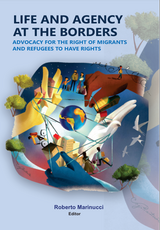External publications

Civil society organizations, migrants, and challenges in African contexts
Jaji, RoseExternal Publications (2024)
in: Roberto Marinucci (ed.), Life and agency at the borders: advocacy for the right of migrants and refugees to have rights, Brasilia: Centro Scalabriniano de Estudos Migratórios (CSEM), 47-65
ISBN: 978-65-85775-12-0
DOI: https://doi.org/10.61301/978-65-85775-12-0.2024.v.26.264
Volltext/Full text
Many people with the necessary financial resources and social capital are able to use “regular” channels of migration and get to their destinations without facing many obstacles. Similarly, people with human capital that is transferable to the country of destination have a better chance of earning decent incomes and enjoying job security in the destination. People of different genders also face varied mobility opportunities depending on gendered cultural norms in the countries of origin and gendered preferences in the labor market in the countries of destination. The unequal mobility opportunities emanating from these factors result in many people resorting to “irregular” migration which often renders them vulnerable to various challenges in transit and in the country of destination. These challenges and the image of “crisis” that is associated with “irregular” migration around the world place the migrants in situations where they need interventions to ensure that they move and live in security and dignity. Many governments are unable or unwilling to guarantee “irregular” migrants’ human rights, security, and dignity. This has resulted in Civil Society Organizations (CSOs) assuming this role. Without government support and faced with government resistance in many cases, assisting the migrants is a daunting task. This article addresses the challenges that CSOs working with migrants in African contexts face. The article frames these challenges around interfaces among CSOs as well as between CSOs and country of transit and destination governments, international organizations, host communities, and the migrants themselves. The article concludes by offering a reflection agenda, which explores possibilities that could strengthen the operations of CSOs in African contexts. This reflection agenda includes linking CSOs in different countries on the continent and beyond in a bid to strengthen CSOs’ voices and promote regional and global resonance in their activities.
Contact
Cornelia Hornschild
Publication Coordinator
E-mail Cornelia.Hornschild@idos-research.de
Phone +49 (0)228 94927-135
Fax +49 (0)228 94927-130
Alexandra Fante
Librarian/ Open Access Coordinator
E-Mail Alexandra.Fante@idos-research.de
Telefon +49 (0)228 94927-321
Fax +49 (0)228 94927-130



![[Translate to English:] Photo: Alexandra Fante, Bibliothekarin/Open Access-Koordinatorin](/fileadmin/_processed_/f/0/csm__c_Deutsches-Institut-fuer-Entwicklungspolitik_Fante_94ce4fa1ba.jpg)